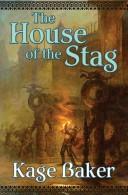Cassidy Percoco reviewed The House of the Stag by Kage Baker
Review of 'The House of the Stag' on 'Goodreads'
5 stars
Quite an epic scope for a novel, and at the same time there's such a cozy domestic feel to it.
The bulk of the story is about Gard, half-demon and half-yendri, from his innocent boyhood in the peaceful forests to oppression by the Riders, enslavement in a mountain, life in the city, and finally his role as self-professed Dark Lord, the Master of the Mountain (different mountain); the rest is about the Saint, the mystical/religious savior of the yendri, a young woman with great powers. Of course, they get married.
What I like best is that it's an amazing story, of course, with each setting and group of characters finely-wrought by the author (who frequently manages a Pratchettian feel in the way high fantasy concepts rub shoulders with normalcy) - but also, a lot of aspects relating to sex and gender feel exceptionally well handled. Gard is a person, not …
Quite an epic scope for a novel, and at the same time there's such a cozy domestic feel to it.
The bulk of the story is about Gard, half-demon and half-yendri, from his innocent boyhood in the peaceful forests to oppression by the Riders, enslavement in a mountain, life in the city, and finally his role as self-professed Dark Lord, the Master of the Mountain (different mountain); the rest is about the Saint, the mystical/religious savior of the yendri, a young woman with great powers. Of course, they get married.
What I like best is that it's an amazing story, of course, with each setting and group of characters finely-wrought by the author (who frequently manages a Pratchettian feel in the way high fantasy concepts rub shoulders with normalcy) - but also, a lot of aspects relating to sex and gender feel exceptionally well handled. Gard is a person, not an avatar for a fantasy of being degraded and then powerful or for toxically masculine fantasies of sex and revenge.
There are a few references to ambiguously consensual demon/yendri couplings, and Gard and the Saint's initial offscreen encounter is somewhat less ambiguously non-consensual - but he is ashamed of this, and he makes amends. Still, this is something you may want to know going in. (At the same time, I would normally run like hell from a plot point like that, but in context, perhaps because of the Saint's saintliness, it does work.)

